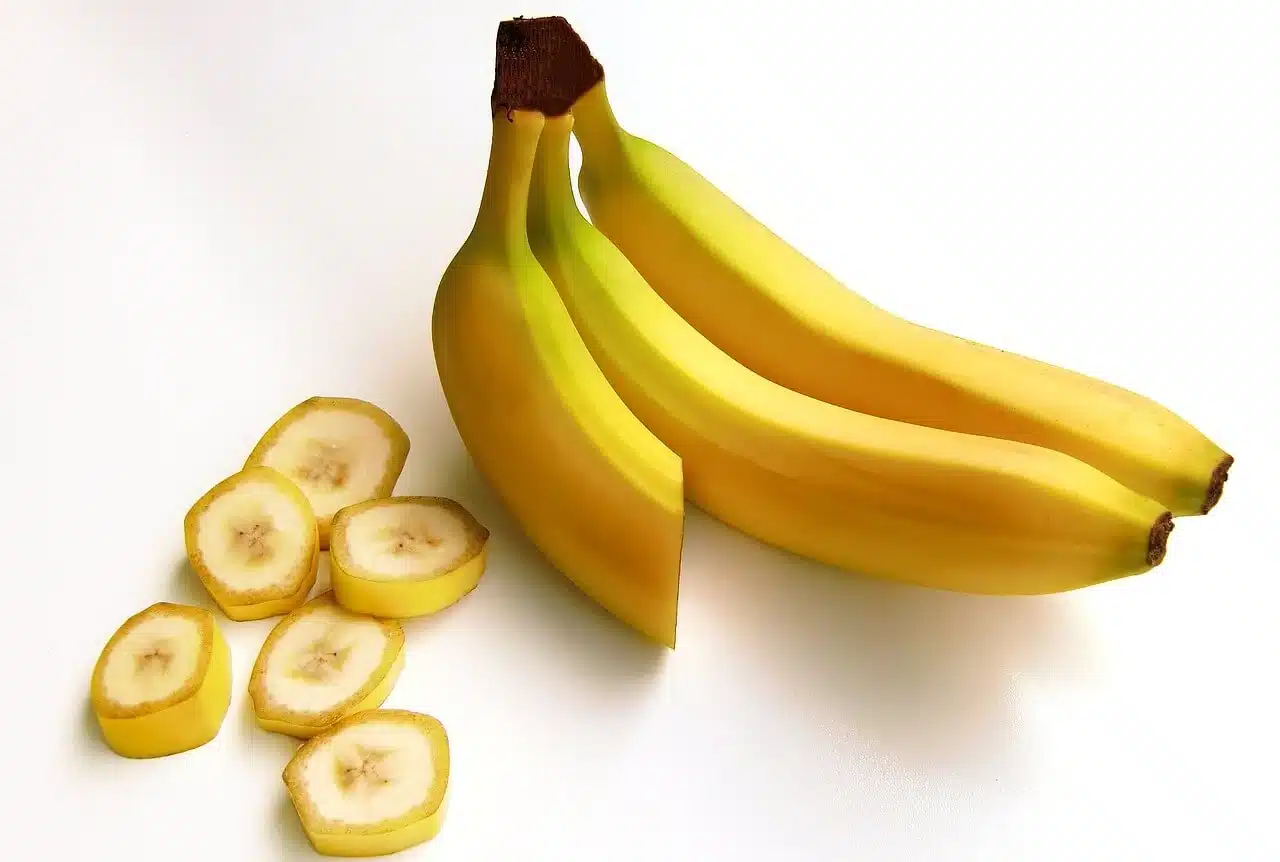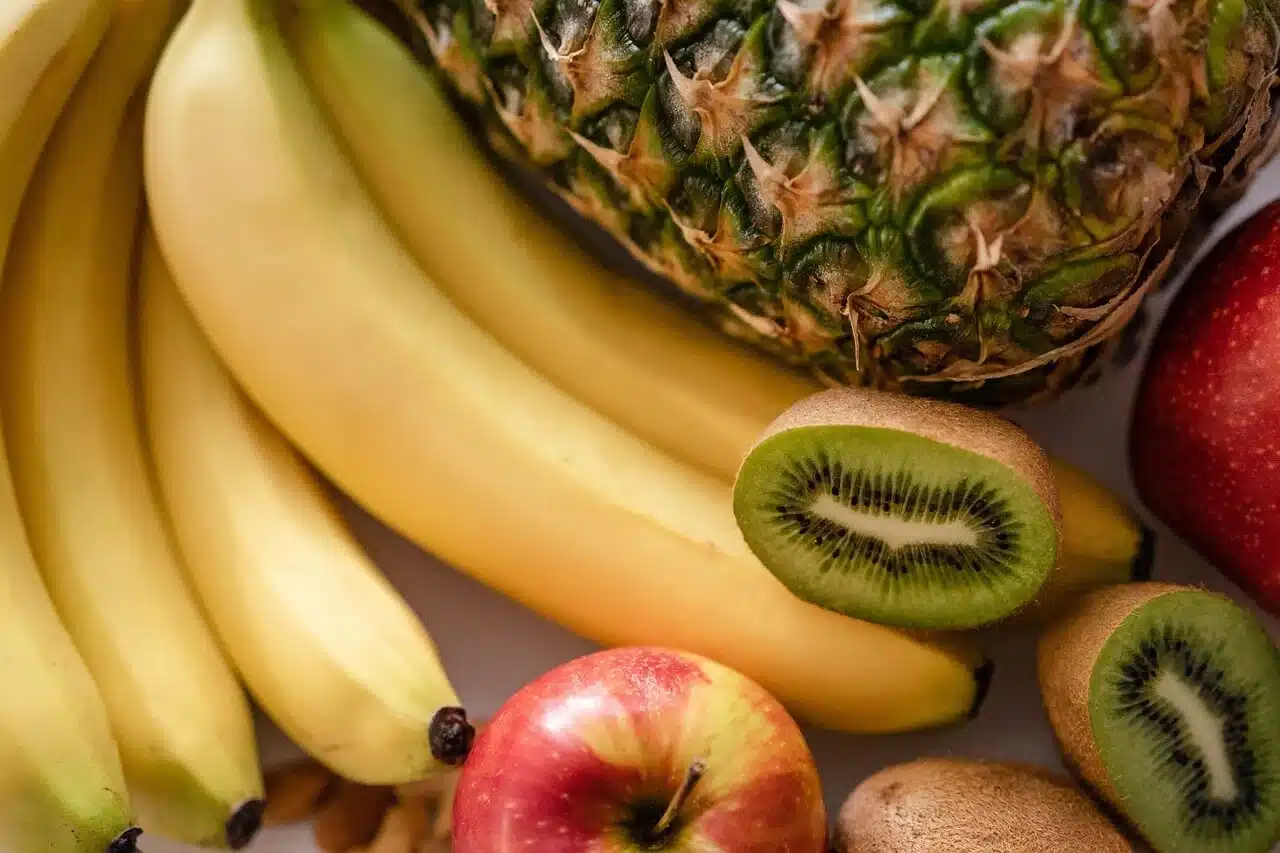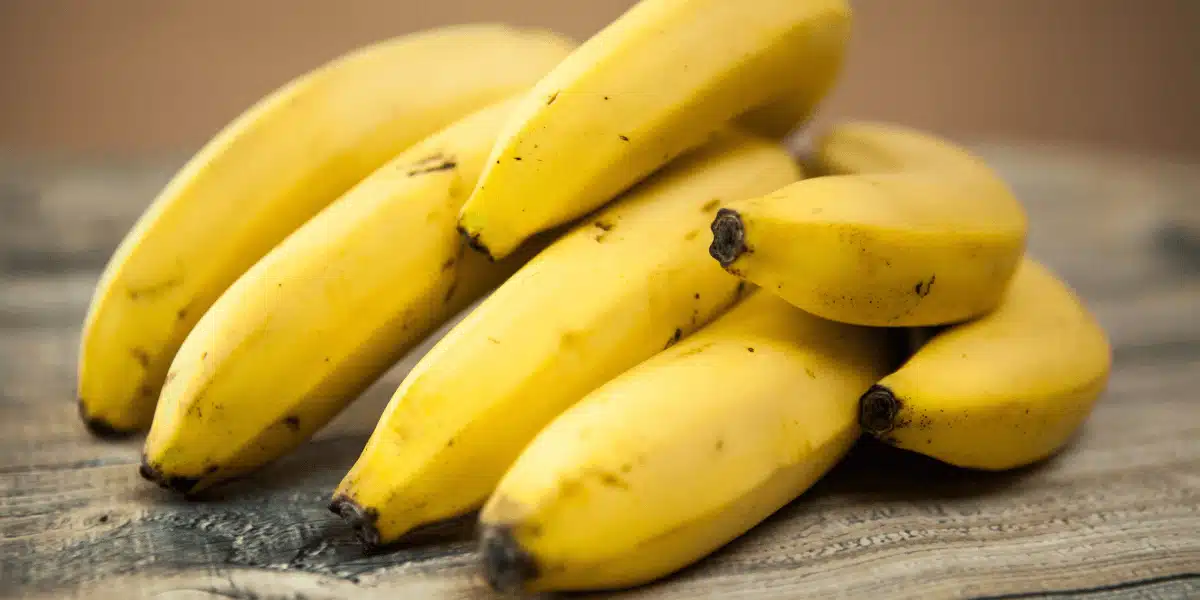Explore if bananas fit into a low FODMAP diet. Essential read for IBS dietary planning and gut health management.
Introduction :
- Bananas Low FODMAP Diet is vital for those with Irritable Bowel Syndrome (IBS). This diet significantly impacts symptom management. It’s important to understand how food affects your gut. Specifically, we focus on bananas and their FODMAP content.
- FODMAPs are specific carbs that can cause discomfort in sensitive individuals. For IBS sufferers, knowing about FODMAPs is crucial. It helps in avoiding foods that trigger symptoms. Bananas, a common fruit, are often questioned for their FODMAP levels.
- The link between bananas and IBS symptoms is not straightforward. It depends on several factors. These include the ripeness of the banana and individual tolerance levels. So, it’s essential to explore this topic in depth.
- In this guide, we delve into the relationship between bananas and the low FODMAP diet. We aim to provide clear, helpful information. This will assist IBS sufferers in making informed dietary choices. Understanding the role of bananas can lead to better symptom management.
- Additionally, we will look at how to incorporate bananas into your diet. This includes considering their ripeness and quantity. Our goal is to help you navigate your dietary choices with confidence.
What are FODMAPs ?

-
FODMAPs stand for Fermentable Oligo-, Di-, Mono-saccharides And Polyols. These are specific types of carbohydrates. Some people know them for causing digestive issues.
- These carbs are not well absorbed in the gut. As a result, they can lead to symptoms like bloating, gas, and stomach pain. This is especially true for people with sensitive digestive systems.
-
A variety of foods contain FODMAPs. This includes certain fruits, vegetables, grains, and dairy products. Understanding which foods contain FODMAPs is key. It helps people with IBS to manage their symptoms better.
-
The link between FODMAPs and digestive discomfort is well-established. Gut bacteria ferment FODMAPs when they reach the large intestine. This fermentation process produces gas. For individuals with IBS, this can cause significant discomfort.
- So, many people with IBS follow a low FODMAP diet. This diet involves reducing the intake of high FODMAP foods. The goal is to minimize gastrointestinal symptoms.
- It’s important to note that FODMAPs are not harmful to everyone. But for those with IBS, managing their intake can make a big difference. It can lead to improved gut health and a better quality of life.
-
Healthline’s Banana Nutrition Facts is a valuable resource for exploring banana nutrition. It provides in-depth information on the nutritional aspects of bananas.
The Nutritional Profile of Bananas
Bananas : A Nutrient Powerhouse
- Bananas are rich in essential nutrients. They offer a variety of health benefits. This makes them a valuable addition to many diets, including a low FODMAP diet.
Vitamins and Minerals in Bananas
- Bananas are a great source of several vitamins and minerals. They are particularly high in Vitamin C and potassium. These nutrients are crucial for overall health. Vitamin C boosts the immune system, while potassium supports heart health.
Fiber Content in Bananas
- Besides vitamins and minerals, bananas are also rich in dietary fiber. Fiber is important for digestive health. It helps in regular bowel movements. This is particularly beneficial for individuals managing IBS symptoms.
Role of Bananas in Gut Health
- Bananas can play a role in improving gut health. They contain prebiotic fiber. This type of fiber feeds the good bacteria in the gut. A healthy gut flora is essential for proper digestion and can be beneficial in a low FODMAP diet.
Bananas and Energy Levels
- Additionally, bananas are a good source of natural sugars and carbohydrates. They provide a quick energy boost.
These snacks are great, especially for people on a restrictive diet like low FODMAP.
Bananas and FODMAP Levels
- Understanding the FODMAP content in bananas is key for those on a low FODMAP diet. This is because FODMAP levels in bananas change based on their ripeness.
- Unripe bananas have lower FODMAP levels. They contain less fructose, a type of sugar that can cause digestive issues for some people. This makes unripe bananas a safer choice for individuals with IBS.
- As bananas ripen, their starches convert into fructose. This increases their FODMAP content. Ripe bananas are sweeter, but they can be more challenging for those with IBS.
-
The amount of banana you can eat without triggering symptoms varies. It depends on how ripe the banana is. We advise sticking to small portions of ripe bananas for a low FODMAP diet.
- It’s important to check your body’s response to bananas. Some people with IBS may tolerate ripe bananas well, while others might not. Personal tolerance can vary greatly.
-
When considering bananas for a low FODMAP diet, focus on two things. First, consider their ripeness. Second, consider your individual tolerance. This will help in managing IBS symptoms more effectively.
The Impact of Bananas on IBS
How Bananas Affect IBS Symptoms
- Bananas can have different effects on people with IBS. This is because everyone’s body reacts differently to foods. For some, bananas are a gentle, easy-to-digest fruit. For others, they might cause IBS symptoms.
- The stage of ripeness of the banana is important. Green, unripe bananas are usually better for IBS. They have less fructose, a sugar that can upset the stomach in some people. But, as bananas get riper, they become sweeter. This means they have more fructose and can be harder to digest for those with IBS.
- It’s really about knowing your own body. Some people might find they can eat ripe bananas with no problems. Others might find they cause discomfort. The best way is to try a little and see how you feel.
- If you find that bananas, ripe or unripe, upset your stomach, it’s okay. There are other fruits you can eat that are low in FODMAPs. These include strawberries, oranges, and grapes. They can be good alternatives to bananas.
- In summary, bananas can be part of an IBS diet, but it’s all about personal tolerance. Pay attention to how your body reacts to them. This will help you manage your IBS symptoms more effectively.
Ripeness and IBS Responses
- The ripeness of the banana plays a crucial role in how it affects IBS. Unripe bananas are easier to tolerate for people with IBS. They have low FODMAP levels, making them a better choice. But, ripe bananas, with higher FODMAP levels, might cause discomfort.
Individual Tolerance to Bananas
- It’s important to understand your personal tolerance to bananas when managing IBS. This involves paying attention to how your body reacts after eating them. Some people might handle ripe bananas well, while others need to stick to unripe ones.
Bananas as Part of an IBS Diet
-
Including bananas in an IBS diet requires careful consideration. It’s about balancing their nutritional benefits with their FODMAP content. Consulting with a healthcare professional is helpful for making informed decisions. These decisions are about including bananas in your diet.
Incorporating Bananas into a Low FODMAP Diet
Choosing the Right Bananas
- When adding bananas to a low FODMAP diet, the first step is choosing the right type. Unripe, green bananas are generally low in FODMAPs. They are a safer choice for people with IBS. Ripe bananas are yellow and sweet. They have higher FODMAP levels. They might not be suitable for everyone.
Managing Part Sizes
- Part control is crucial when eating bananas on a low FODMAP diet. Even with unripe bananas, it’s important to start with small amounts. This helps to gauge how your body reacts. Limit yourself to a small part of ripe bananas. Avoid triggering IBS symptoms by only consuming a third of a banana.
Listening to Your Body
- Every individual with IBS has unique triggers. It’s essential to listen to your body when incorporating bananas into your diet. Pay attention to any changes in your symptoms. Adjust your banana intake based on your personal tolerance.
Alternatives to Bananas
- If bananas don’t suit your low FODMAP diet, there are alternatives. Other low FODMAP fruits like strawberries, oranges, and grapes can be good substitutes. They provide similar nutritional benefits without the risk of triggering IBS symptoms.
Alternative Low FODMAP Fruits

Finding Suitable Fruit Alternatives
- If bananas are not ideal for your low FODMAP diet, there are plenty of other fruit options. These alternatives can provide similar nutritional benefits without the high FODMAP content.
Low FODMAP Fruit Options
-
Strawberries are a sweet and juicy option. They are low in FODMAPs and can be a great alternative to bananas. They are also rich in vitamins and antioxidants.
-
Oranges: Citrus fruits like oranges are another low FODMAP choice. They offer a good dose of Vitamin C and are refreshing and hydrating.
-
Grapes: Grapes are low in FODMAPs and can be a convenient snack. They are also a good source of vitamins and antioxidants.
-
Kiwi: Kiwi is a unique fruit that is low in FODMAPs. It’s packed with nutrients and can add a tropical twist to your diet.
- Cantaloupe: This melon is another excellent low FODMAP fruit. It’s hydrating and has a sweet, mild flavor.
Incorporating These Fruits into Your Diet
-
You can eat these fruits on their own or add them to meals. They work well in salads, smoothies, and as toppings for yogurt or oatmeal. Experimenting with these fruits can add variety and flavor to your low FODMAP diet. For further guidance, the Monash University FODMAP Diet offers extensive resources.
FAQs : Bananas Low FODMAP Diet
Can I eat bananas on a low FODMAP diet ?
Yes, you can eat bananas on a low FODMAP diet. But it depends on how ripe they are and how much you eat. Green bananas are low in FODMAPs and usually okay for people with IBS. They have less fructose, a sugar that can upset your stomach. But ripe bananas get sweeter and have more FODMAPs. This can cause IBS symptoms for some people. Try eating a small piece of ripe banana to see how you feel. Everyone is different. Some people are fine with ripe bananas, but others aren’t. It’s about knowing what your body can handle. If you’re not sure, talk to a doctor or dietitian. They can give advice that fits your needs and IBS symptoms.
Are there other low FODMAP fruits I can eat instead of bananas ?
Yes, there are other fruits you can eat. These include strawberries, oranges, grapes, kiwi, and cantaloupe. Strawberries are sweet and full of vitamins. Oranges are refreshing and good for Vitamin C. Grapes are easy to snack on and healthy. Kiwi is tasty and full of vitamins. Cantaloupe is sweet and helps keep you hydrated. You can eat these fruits alone or in dishes like salads and smoothies. They add variety and nutrients to your diet. Just like bananas, see how these fruits affect you. Start with small amounts and adjust as needed. This way, you can enjoy these fruits without upsetting your IBS.”
Concluding Thoughts on Bananas in Low FODMAP Diets
- Understanding how bananas fit into a low FODMAP diet is key for managing IBS. It’s about making choices that suit your body. Bananas can be part of your diet, but it depends on their ripeness and how much you eat.
- Remember, green bananas are usually okay as they have lower FODMAPs. But as bananas ripen, they get sweeter and their FODMAP levels go up. This can be a problem for some people with IBS.
- It’s important to listen to your body. Start with small amounts of banana and see how you feel. Everyone’s different, and what works for one person might not work for another.
- If bananas don’t work for you, there are other low FODMAP fruits to try. Strawberries, oranges, grapes, kiwi, and cantaloupe are all good options. They can add variety and nutrients to your diet without causing discomfort.
- Managing IBS with diet can be challenging. But with the right information and choices, you can find foods that work for you. This can lead to better gut health and a more comfortable life.
- If you’re unsure about what to eat, it’s always a good idea to talk to a healthcare professional. They can give you personalized advice and help you make the best choices for your IBS management.

